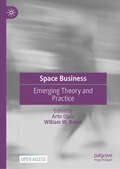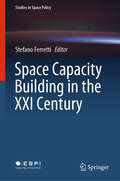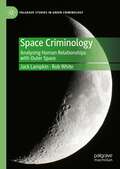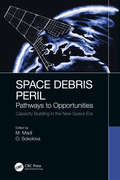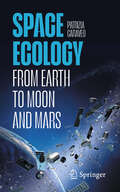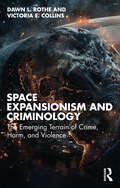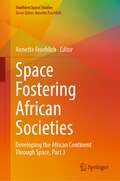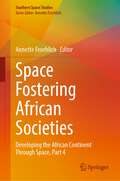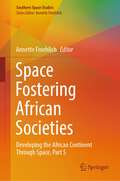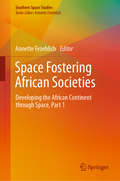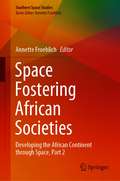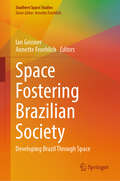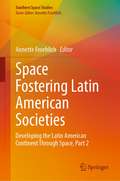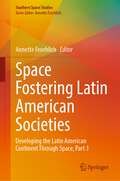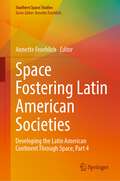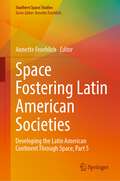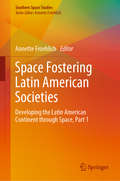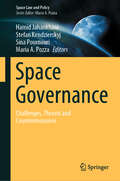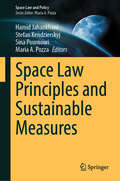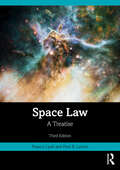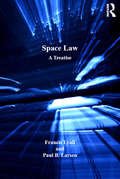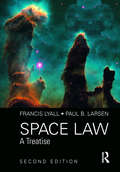- Table View
- List View
Sozialunternehmen
by Sebastian GöseDas Buch unterstützt Unternehmen bei der Integration von Menschen mit Behinderung in den 1. Arbeitsmarkt. So versucht die Case Study ein Grundverständnis dafür zu schaffen, welche Herausforderungen das Management von Sozialunternehmen beinhaltet. Dazu werden insbesondere Themen aus der Personalführung, dem Personalmanagement, der Unternehmenskultur sowie die besonderen Bedürfnisse von Menschen mit Handicap analysiert. Darüber hinaus wird erarbeitet, was ein „Social Business“ von „Social Entrepreneurship“ oder „Social Enterprise“ unterscheidet. Außerdem wird das Social Business mit Blick auf die direkte und indirekte Erfüllung gesellschaftlicher Bedürfnisse mit dem „Commercial Business“ verglichen. So wird herausgearbeitet, wie speziell Sozialunternehmen als neue Unternehmensform Menschen mit Handicap helfen und von diesen genutzt werden können. Die Case Study beschreibt, wie ein Businessplan von einem Unternehmen in der Sozialwirtschaft aussehen könnte. Darüber hinaus wird die spezielle Unternehmenskultur am Beispiel der AfB gGmbH diskutiert und wie sich diese von der herkömmlicher Unternehmen unterscheidet. Des Weiteren werden die besonderen Herausforderungen bei der Akquise von Menschen mit Handicap und deren Integration in ein Unternehmen behandelt.So setzen sich die Bearbeiterinnen und Bearbeiter mit den Entwicklungsmöglichkeiten der AfB gGmbH auseinander und entwickeln ein nachhaltiges Konzept zur gewünschten Expansion des Unternehmens.Die Leuphana Case Studies sind ein Projekt, das in Zusammenarbeit mit kleinen und mittelständischen Unternehmen erstellt und entwickelt worden ist. Sie sind ein Lehrbuch, mit dessen Hilfe Unternehmen, die vor ähnlichen Herausforderungen stehen, selbige bewältigen können. Dafür ist keine Hilfe von Dritten notwendig. Auf Grundlage der einzelnen Case Studies werden den Bearbeiterinnen und Bearbeitern elementare Werkzeuge aus der wissenschaftlichen Theorie erklärt. Diese können sie anwenden, um mit den Insiderkenntnissen des eigenen Unternehmens Prozesse zu optimieren, Ziele entwickeln und erreichen oder schwierige Herausforderungen zu bewältigen.
Sozialwirtschaft kompakt: Grundzüge der Sozialwirtschaftslehre (essentials)
by Wolf Rainer WendtDieses essential enthält eine kurze und prägnante Darstellung der Theorie sozialen Wirtschaftens. Es erhellt den Handlungsbereich der personenbezogenen Wohlfahrtsproduktion im sozialen Versorgungssystem und im organisierten Zusammenwirken professioneller, frei engagierter und selbstbetroffener Akteure. In der Sozialwirtschaftslehre wird die Erbringung sozialer und gesundheitsbezogener Leistungen institutionell und funktional begriffen.
Soziologie der Würde: Eine Einführung in ihre Problemzugänge, Analysen und Befunde
by Friedrich W. StallbergDieses Studienbuch bietet eine soziologische Einführung in die konfliktreiche Welt der Menschenwürde. In Abgrenzung zum vorherrschenden normativen Verständnis von Würde wird diese als eine Achtung und Autonomie anstrebende individuelle Handlungsorientierung beschrieben, die interaktiv und institutionell geformt ist, und deren Erfolgschancen von den umfassenden gesellschaftlichen Verhältnissen abhängen. Da sich Würde im Alltag erst in Situationen der Bedrohtheit und Beschädigung als für Lebensführung und Identität unentbehrlich zu erkennen gibt, konzentriert sich auch die Darstellung ihrer Realität auf Risiken, Formen und zentrale Schauplätze ihrer Beeinträchtigung.
Space Business: Emerging Theory and Practice
by William W. Baber Arto OjalaThis book is an academic investigation of commercial activities of firms in the space related industries and those utilizing services provided by space technology firms. These firms and their activities are part of the “New Space” concept where space related commercial activities are undertaken and funded by private firms rather than government institutions. New Space is leading to business model innovation and new theory about space business activities including upstream and downstream commercial activities. Upstream value chains include activities prior to turnover of launched systems to operators. Downstream value chains include operation of systems in space as well as the transfer, processing, and sale of space-based data and data services. The commercial activities of space business now reach into everyday lives of most humans from banking and disaster management to resource monitoring to tourism. With such broad reach, the New Space ecosystem is rapidly developing in importance and complexity.
Space Capacity Building in the XXI Century (Studies in Space Policy #22)
by Stefano FerrettiThis book, edited by the European Space Policy Institute, is the first international publication, following UNISPACE+50, to analyze how space capacity building can empower the international community towards fully accessing all the economic and societal benefits that space assets and data can offer. New innovation models are increasingly spreading across various sectors and disciplines, including space, which is becoming an integral part of many societal activities (e.g. telecoms, weather, climate change and environmental monitoring, civil protection, infrastructures, transportation and navigation, healthcare and education). The book helps readers construct their own space capacity building roadmaps, which take into account key stakeholders and also new private actors, NGOs and civil society. Starting from a policy and strategy perspective, it addresses key aspects of capacity building, including innovation and exploration, global health, climate change and resilient societies. It outlines the available options and summarizes the ideal programmatic conditions for their successful implementation. Showcasing reflections from a range of senior space professionals around the world, with their unique perspectives and solutions, it provides a rich mosaic in which various cultural and policy approaches to space are translated into actionable programs and ideas so that space may truly benefit all of humankind.
Space Criminology: Analysing Human Relationships with Outer Space (Palgrave Studies in Green Criminology)
by Rob White Jack LampkinAs humans expand the frequency and scale of interactions off-planet, Space Criminology ponders the nature of crime, harm and transgression in outer space and possible responses to these. The first book of its kind, it discusses the dynamics of space crime, from those involving powerful elites through to those associated with the mundane interactions of people living and working in space. It is essential reading for anyone interested in extra-terrestrial crime, space law, and criminal justice.
Space Debris Peril: Pathways to Opportunities
by M. Madi and O. Sokolova"This book provides up-to-date knowledge of space debris and valuable insights on how to grapple with this issue from legal, technical, economical and societal aspects. I would strongly recommend that everyone who is working on space development and utilizations and even non-specialists once read this book and think over how human being should be faced with this issue." –Prof. Shinichi Nakasuka, University of Tokyo, Japan Space Debris Peril: Pathways to Opportunities takes readers through the wide spectrum of problems created by space debris – including technical, political, legal and socio-economical aspects – and suggests ways to mitigate its negative consequences and create new opportunities. With chapter contributions from authors at world-renowned universities, private or public entities, and research institutes active in the field of space debris mitigation, space policy and law, risk and resilience, liability and insurance, this book provides a comprehensive introduction to the subject helping the reader to grasp the whole picture of the current space debris remediation challenges. This book will be of interest to the scientific communities, policy makers, business developers, (re)insurers and international standards developers for space operations and orbital debris mitigation. Also, it should appeal to a broader audience among non-specialists in various sectors and the general public. Key features: Brings together interdisciplinary perspectives on the topic in one, cohesive book Chapter contributions from specialists in this interdisciplinary field from around the globe Up-to-date information with the latest developments
Space Ecology: From Earth to Moon and Mars
by Patrizia CaraveoThe recent entry of private entrepreneurs into the world of space has multiplied the number of services provided by instruments in orbit, resulting into a rapid and tumultuous growth of the space economy. More services translate into more launches bringing into orbit more satellites. As a result, circum-terrestrial orbits are filling up alarmingly, and we are only at the beginning of the proliferation of mega constellations that have sprung up in recent years to provide planet-wide Internet connectivity. There are neither national nor international laws for managing the number of orbiting satellites that are growing at such a dizzying rate that real orbital traffic jams are feared. We need to extend to the space around us, but also to the other bodies in the solar system, the concept of sustainable use so as not to repeat the same mistakes we have made on Earth's surface. Around our planet we need to avoid overcrowding of orbits so as not to endanger our planet's economy, which is heavily dependent on the use of satellites. Looking further afield, to the Moon and Mars, for example, we must balance resource utilization with unnecessary pollution of fragile ecosystems. Human settlements will have to respect the ecosystem of these celestial bodies that do not belong to any state but must be absolutely protected in order to prevent an interplanetary version of the tragedy of the commons, unfortunately so familiar in our planet. Particular attention must be paid to the risks of biological pollution. Explorers (both human and robotic) risk carrying terrestrial material. Similarly, handling extraterrestrial samples requires well-equipped laboratories and continuous surveillance.
Space Expansionism and Criminology: The Emerging Terrain of Crime, Harm, and Violence
by Dawn L. Rothe Victoria E. CollinsWe have entered a recent zeitgeist, the era of the "new space age", driven by billionaires, technological advancements, and a few dominating state powers. While the race to space may be said to offer "new" opportunities for "humanity", we ask, is it predicated on the same logics and historical patterns of the past? This question guides our approach and critical assessment of human expansionism into space. Space Expansionism and Criminology: The Emerging Terrain of Crime, Harm, and Violence offers readers a critical analysis of space expansionism and today’s race to space that has come to define our contemporary era. Taking a retrospective and prospective approach, we delve into the choices being made, the justifications being offered, and those excluded from the hegemonic discourse of the benefits of humans as extraplanetary beings. Space Expansionism and Criminology includes chapters on the historical roots of today’s space race, weaponization and realpolitik, space junk and debris, space mining and resource extrapolation, the burgeoning space tourism market, the manufacturing of space nostalgia from the 1950s through today, and efforts towards, and claims-making for, space colonization to save Earth and humanity.
Space Fostering African Societies: Developing the African Continent Through Space, Part 3 (Southern Space Studies)
by Annette FroehlichThis peer-reviewed book provides detailed insights into how space and its applications are, and can be used to support the development of the full range and diversity of African societies, as encapsulated in the African Union’s Agenda 2063. Following on from Part 1 and 2, which were highly acclaimed by the space community, it focuses on the role of space in supporting the UN Sustainable Development Goals in Africa, but covers an even more extensive array of relevant and timely topics addressing all facets of African development. It demonstrates that, while there have been significant achievements in recent years in terms of economic and social development, which have lifted many of Africa’s people out of poverty, there is still a great deal that needs to be done to fulfill the basic needs of Africa's citizens and afford them the dignity they deserve. To this end, space is already being employed in diverse fields of human endeavor to serve Africa’s goals for its future, but there is much room for further incorporation of space systems and data. Providing a comprehensive overview of the role space is playing in helping Africa achieve its developmental aspirations, the book will appeal to both students and professionals in fields such as space studies, international relations, governance, and social and rural development.
Space Fostering African Societies: Developing the African Continent Through Space, Part 4 (Southern Space Studies)
by Annette FroehlichThis peer-reviewed book provides detailed insights into how space and its applications are, and can be used to support the development of the full range and diversity of African societies, as encapsulated in the African Union’s Agenda 2063. Following on from Part 1 to Part 3, which was highly acclaimed by the space community, it focuses on the role of space in supporting the UN Sustainable Development Goals in Africa, but covers an even more extensive array of relevant and timely topics addressing all facets of African development. It demonstrates that, while there have been significant achievements in recent years in terms of economic and social development, which have lifted many of Africa’s people out of poverty, there is still a great deal that needs to be done to fulfill the basic needs of Africa's citizens and afford them the dignity they deserve. To this end, space is already being employed in diverse fields of human endeavor to serve Africa’s goals for its future, but there is much room for further incorporation of space systems and data. Providing a comprehensive overview of the role space is playing in helping Africa achieve its developmental aspirations, the book will appeal to both students and professionals in fields such as space studies, international relations, governance, social, rural and technical development.
Space Fostering African Societies: Developing the African Continent Through Space, Part 5 (Southern Space Studies)
by Annette FroehlichThis peer-reviewed book provides detailed insights into how space and its applications are, and can be used to support the development of the full range and diversity of African societies, as encapsulated in the African Union’s Agenda 2063. Following on from Part 1 to Part 4, which were highly acclaimed by the space community, it focuses on the role of space in supporting the UN Sustainable Development Goals in Africa, but covers an even more extensive array of relevant and timely topics addressing all facets of African development. It demonstrates that, while there have been significant achievements in recent years in terms of economic and social development, which have lifted many of Africa’s people out of poverty, there is still a great deal that needs to be done to fulfill the basic needs of Africa's citizens and afford them the dignity they deserve. To this end, space is already being employed in diverse fields of human endeavor to serve Africa’s goals for its future, but there is much room for further incorporation of space systems and data. Providing a comprehensive overview of the role space is playing in helping Africa achieve its developmental aspirations, the book will appeal to both students and professionals in fields such as space studies, international relations, governance, social, rural and technical development.
Space Fostering African Societies: Developing the African Continent through Space, Part 1 (Southern Space Studies)
by Annette FroehlichThis book provides detailed insights into how space and its applications are, and can be, used to support the development of the full range and diversity of African societies, as encapsulated in the African Union’s Agenda 2063. Like previous books in the "Southern Space Studies" series, it focuses on the role of space in supporting the UN Sustainable Development Goals in Africa, but it covers an even more extensive array of relevant and timely topics addressing all facets of African development. It demonstrates that, while great achievements have been made in recent years in terms of economic and social development, which has lifted many of Africa’s people out of poverty, there is still much that needs to be done to fulfill the basic needs of Africa's citizens and afford them the dignity they deserve: to this end space is already being employed in diverse fields of human endeavor to serve Africa’s goals for its future, but there is much room for further incorporation of space systems and data. Providing a comprehensive overview of the role space is playing in achieving Africa’s developmental aspirations, the book is of great interest to both students and professionals in fields such as space studies, international relations, governance, social and rural development, and many others.
Space Fostering African Societies: Developing the African Continent through Space, Part 2 (Southern Space Studies)
by Annette FroehlichThis peer-reviewed book provides detailed insights into how space and its applications are, and can be used to support the development of the full range and diversity of African societies, as encapsulated in the African Union’s Agenda 2063. Following on from Part 1, which was highly acclaimed by the space community, it focuses on the role of space in supporting the UN Sustainable Development Goals in Africa, but covers an even more extensive array of relevant and timely topics addressing all facets of African development. It demonstrates that, while there have been significant achievements in recent years in terms of economic and social development, which have lifted many of Africa’s people out of poverty, there is still a great deal that needs to be done to fulfill the basic needs of Africa's citizens and afford them the dignity they deserve. To this end, space is already being employed in diverse fields of human endeavor to serve Africa’s goals for its future, but there is much room for further incorporation of space systems and data. Providing a comprehensive overview of the role space is playing in helping Africa achieve its developmental aspirations, the book will appeal to both students and professionals in fields such as space studies, international relations, governance, and social and rural development.
Space Fostering Brazilian Society: Developing Brazil Through Space (Southern Space Studies)
by Annette Froehlich Ian GrosnerThis peer-reviewed book provides a comprehensive overview of the role of space exploration and technology in Brazil. The Brazilian space sector is currently experiencing rapid growth, with new participants entering the field and space applications increasingly supporting the country's social, economic, and political development. There is a growing recognition of space as a vital component of Brazil's development agenda. Despite significant progress in recent years that has improved the living conditions of many Brazilians and helped lift people out of poverty, much work remains to be done to meet the basic needs of all citizens and ensure they receive the respect they deserve. Space technology is already being utilized in various sectors to help achieve Brazil's future objectives, and there are still ample opportunities to expand the use of space systems and data. The book will be of interest to researchers, professionals, and students in fields such as space studies, international relations, governance, and social and rural development.
Space Fostering Latin American Societies: Developing the Latin American Continent Through Space, Part 2 (Southern Space Studies)
by Annette FroehlichThis peer-reviewed book presents a comprehensive overview of the role space is playing in enabling Latin America to fulfill its developmental aspirations. Following on from the highly acclaimed Part 1, it explains how space and its applications can be used to support the development of the full range and diversity of Latin America societies, while being driven by Latin American goals. The Latin American space sector is currently undergoing a phase of rapid and dynamic expansion, with new actors entering the field and with space applications increasingly being used to support the continent’s social, economic, and political development. All across Latin America, attention is shifting to space as a fundamental part of the continental development agenda, and the creation of a Latin American space agency is evidence of this. Additionally, while in recent years, significant advances in economic and social development have lifted many of Latin America’s people out of poverty, there is still much that needs to be done to fulfill the basic needs of the population and to afford them the dignity they deserve. To this end, space is already being employed in diverse fields of human endeavor to serve Latin America’s goals for its future, but there is still a need for further incorporation of space systems and data. This book will appeal to researchers, professionals and students in fields such as space studies, international relations, governance, and social and rural development.
Space Fostering Latin American Societies: Developing the Latin American Continent Through Space, Part 3 (Southern Space Studies)
by Annette FroehlichThis peer-reviewed book presents a comprehensive overview of the role space is playing in enabling Latin America to fulfill its developmental aspirations. Following on from the highly acclaimed Part 1 and Part 2, it explains how space and its applications can be used to support the development of the full range and diversity of Latin America societies, while being driven by Latin American goals. The Latin American space sector is currently undergoing a phase of rapid and dynamic expansion, with new actors entering the field and with space applications increasingly being used to support the continent’s social, economic, and political development. All across Latin America, attention is shifting to space as a fundamental part of the continental development agenda, and the creation of a Latin American space agency is evidence of this. Additionally, while in recent years, significant advances in economic and social development have lifted many of Latin America’s people out of poverty, there is still much that needs to be done to fulfill the basic needs of the population and to afford them the dignity they deserve. To this end, space is already being employed in diverse fields of human endeavor to serve Latin America’s goals for its future, but there is still a need for further incorporation of space systems and data. This book will appeal to researchers, professionals and students in fields such as space studies, international relations, governance, and social and rural development.
Space Fostering Latin American Societies: Developing the Latin American Continent Through Space, Part 4 (Southern Space Studies)
by Annette FroehlichThis peer-reviewed book presents a comprehensive overview of the role space is playing in enabling Latin America to fulfil its developmental aspirations. Following on from the highly acclaimed Parts 1 to 3, it explains how space and its applications can be used to support the development of the full range and diversity of Latin America societies, while being driven by Latin American goals. The Latin American space sector is currently undergoing a phase of rapid and dynamic expansion, with new actors entering the field and with space applications increasingly being used to support the continent’s social, economic, and political development. All across Latin America, attention is shifting to space as a fundamental part of the continental development agenda, and the creation of a Latin American space agency is evidence of this. Additionally, while in recent years, significant advances in economic and social development have lifted many of Latin America’s people out of poverty, there is still much that needs to be done to fulfil the basic needs of the population and to afford them the dignity they deserve. To this end, space is already being employed in diverse fields of human endeavour to serve Latin America’s goals for its future, but there is still a need for further incorporation of space systems and data. This book will appeal to researchers, professionals and students in fields such as space studies, international relations, governance, and social and rural development.
Space Fostering Latin American Societies: Developing the Latin American Continent Through Space, Part 5 (Southern Space Studies)
by Annette FroehlichThis peer-reviewed book presents a comprehensive overview of the role space is playing in enabling Latin America to fulfil its developmental aspirations. Following on from the highly acclaimed Parts 1 to 4, it explains how space and its applications can be used to support the development of the full range and diversity of Latin America societies, while being driven by Latin American goals. The Latin American space sector is currently undergoing a phase of rapid and dynamic expansion, with new actors entering the field and with space applications increasingly being used to support the continent’s social, economic, and political development. All across Latin America, attention is shifting to space as a fundamental part of the continental development agenda, and the creation of a Latin American space agency is evidence of this. Additionally, while in recent years, significant advances in economic and social development have lifted many of Latin America’s people out of poverty, there is still much that needs to be done to fulfil the basic needs of the population and to afford them the dignity they deserve. To this end, space is already being employed in diverse fields of human endeavour to serve Latin America’s goals for its future, but there is still a need for further incorporation of space systems and data. This book will appeal to researchers, professionals and students in fields such as space studies, international relations, governance, and social and rural development.
Space Fostering Latin American Societies: Developing the Latin American Continent through Space, Part 1 (Southern Space Studies)
by Annette FroehlichThis book presents a comprehensive overview of the role space is playing in unlocking Latin America’s developmental aspirations. It explains how space and its applications can be used to support the development of the full range and diversity of Latin American societies, while being driven by Latin American goals. The Latin American space sector is currently undergoing a phase of rapid and dynamic expansion, with new actors entering the field and with space applications increasingly used to support the continent’s social, economic, and political development. All across Latin America, attention is shifting to space as a fundamental part of the continental development agenda, and the creation of a Latin American space agency is evidence of this. Additionally, while in recent years, great advances in economic and social development have lifted many of Latin America’s people out of poverty, there is still much that needs to be done to fulfill the basic needs of the population and to afford them the dignity they deserve. To this end, space is already being employed in diverse fields of human endeavor to serve Latin America’s goals for its future, but there is still a need for further incorporation of space systems and data. The book is of great interest to researchers, professionals and students in fields such as Space Studies, International Relations, Governance, Social and Rural Development, and many others.
Space Governance: Challenges, Threats and Countermeasures (Space Law and Policy)
by Hamid Jahankhani Stefan Kendzierskyj Maria A. Pozza Sina PournouriThis book delves into the complexities of space governance, offering innovative solutions for a sustainable future. From the pressing issues facing space governance today to creating a consensus on responsibility, ethics, and frameworks, we aim to answer key questions: (i) What are the current challenges? (ii) How do satellites impact society? (iii) What are the potential negative consequences? From communication and early warning systems to global broadcasting and navigation, satellite technology plays a pivotal role in our daily lives. However, this reliance also exposes vulnerabilities, as any disruption to satellite systems could have disastrous consequences across multiple industries. The rapid development of satellite technology, including drones and UAVs, has ushered in a new era of exploration and exploitation. Yet, this progress brings with it new challenges, particularly in terms of governance. As satellites transcend national boundaries, the dynamics of space governance become increasingly complex, with various entities pursuing their own interests without always considering the broader implications. This book bridges the knowledge gap surrounding space technology and highlights the need for increased governance frameworks, data protection, and disciplined deployment. By addressing issues of control, privacy, and security, we pave the way for a more sustainable and responsible approach to space exploration. Join us on this journey as we navigate the evolving landscape of space governance and chart a course towards a brighter future for all.
Space Law Principles and Sustainable Measures (Space Law and Policy)
by Hamid Jahankhani Stefan Kendzierskyj Maria A. Pozza Sina PournouriThis book helps to bridge the knowledge gap that currently surrounds space technology and its method of exploration and highlights much-needed awareness and attention to an increase in Space Law and sustainable measures. The ever-increasing usage of space-based solutions by both public and commercial entities is producing congestion in the radio frequency spectrum as well as orbital slots. The inevitable commercialization of satellite technology will certainly result in a proliferation of privately owned and managed satellite spacecraft in low-Earth orbits. Cyber vulnerabilities in the Air Force and the DoD frequently ignore satellite ground systems. Space ground system cyber security assaults and investigations include those involving satellite control, communications terminal hacking, and GPS spoofing. A continuous cyber security assessment technique is required for space systems to identify, assess, reduce, and address sophisticated cyber threats. Risk-based compliance, regular cybersecurity risk assessments, and a renewed focus on the elimination of system flaws at the time of design are all necessary for space ground and control systems. Due to the absence of a rigid regulatory framework, satellites play a significant part in the production of space debris, which is a source of increasing worry. Such debris manufactured artificially contributes greatly to the destruction of the environment in Earth’s orbit. There is not a single framework in existence that can appropriately govern contemporary concerns like the security of satellite data and debris in orbit. The Department of Defence (DoD) is now responsible for monitoring all objects in space; however, it cannot require satellite operators to take precautions against potential collisions.
Space Law: A Treatise
by Francis Lyall Paul B. LarsenAs space continues to attract substantial public and private investment and has become ever more active, the third edition of this book has been updated to cover recent developments. This includes the legal bases of UN Resolution 76/3, the Space3030 Agenda, which envisages ‘space as a driver of sustainable development’ and sets out an extensive programme for the future. The work also takes account of adaptations and augmentations to basic space treaties. It examines the increasing commercialisation of space in areas such as space tourism and space mining, for which four states have already adopted relevant legislation. The impact of new technologies such as satellite constellations and micro-satellites are also scrutinised. At a time when space tourism is available to those who can afford it and when the moon will shortly be revisited with a prospect of permanent bases, this third edition provides a firm base for the next generation of space lawyers. As with previous editions, the work draws from governmental, international organisational and other authoritative sources as well as the relevant literature in the field. The book will be an essential and comprehensive resource for students, academics and researchers as well as space agencies, governments and space-active companies. It will also be of value to technical operatives and managers who need to know the legal context within which they work.
Space Law: A Treatise (Library Of Essays In International Law Ser.)
by Francis Lyall Paul B. LarsenThe opening of space to exploration and use has had profound effects on society. Remote sensing by satellite has improved meteorology, land use and the monitoring of the environment. Satellite television immediately informs us visually of events in formerly remote locations, as well as providing many entertainment channels. World telecommunication facilities have been revolutionised. Global positioning has improved transport. This book examines the varied elements of public law that lie behind and regulate the use of space. It also makes suggestions for the development and improvement of the law, particularly as private enterprise plays an increasing role in space.
Space Law: A Treatise 2nd Edition (Library Of Essays In International Law Ser.)
by Francis Lyall Paul B. LarsenFrancis Lyall and Paul B. Larsen have been involved in teaching and researching space law for over 50 years. This new edition of their well-received text gathers together their knowledge and experience in readable form, and covers developments in all space applications, including space tourism, telecommunications, the ITU and finance. With an extensive citation of the literature, the discussion provides an excellent source for both students and practitioners.



